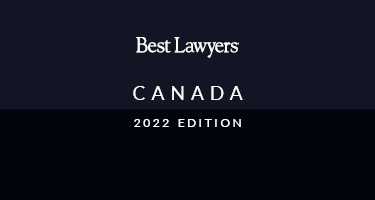We chatted with Jeff Hirsch of Thompson Dorfman Sweatman LLP to discuss his work in administrative law as well as with the Federation of Law Societies of Canada.
Can you tell me a little about your background and how you got into law?
Sure. So I’ve been a practicing lawyer—this is my 30th year of practice. I have a litigation, or advocacy, practice, and I’ve always wanted to be a lawyer. So I went to law school after getting an undergrad degree in political science and international relations. And when I went to law school, about 30 years ago—actually, about 35 years ago—my plan was to be an international lawyer, because I liked politics and history. That was my plan. What actually happened is that the first day of my articling, or clerkship, someone came into my office where I was getting my orientation and said, “Who wants to practice litigation?” I put my hand up, and now I’ve been a litigation lawyer for 30 years. It was just fate.
So I do, as I say, an advocacy practice, and most of my work is in administrative law. I do a lot of professional regulation for self-regulating professions, primarily prosecution and policy advice. And that’s how it’s been for most of my career.
Can you describe your practice and any cases you’ve worked on that particularly stick out in your memory?
Well as I indicated, my practice is interesting; it’s changed over time. I’ve done a variety of different kinds of work: insurance, defense, litigation, bankruptcy and insolvency, general civil litigation. And then, as I got more involved on the volunteer side with the profession, I developed an expertise on the administrative law side, primarily relating to registration matters and professional discipline matters, first with the legal profession through our law society here in Manitoba, and then nationally with the Federation of Law Societies of Canada. That experience, all that volunteer time, assisted in making me very proficient in that area of the law, and that really naturally evolved into my actual working practice where, as I said, I do a lot of administrative law for self-regulating professions, primarily in the health care field—so pharmacists, nurses, paramedics, but also self-regulating professions. The work that I do for them is a mix of policy advice. So I will give advice to self-regulating professions with respect to discipline matters where I will advise panels on discipline proceedings; I will give operational advice to self-regulating professions; I’ll also do a fair bit of work prosecuting members. That’s really the main direction of my work these days, in the administrative law in that area.
Can you tell me about your work with the Federation of Law Societies of Canada? How did you get started with the organization, and what are some of the more notable moments working there?
That’s a great question! The second part in particular.
It was fairly organic. My involvement as a volunteer in the legal regulators’ world goes back to about 2002 when I first became a bencher director selected in Manitoba for our local law society, the Law Society of Manitoba. So I became a bencher in 2002, and I was elected four times, served as a bencher in Manitoba, and I was the president of the Law Society of Manitoba in 2009 and 2010.
So as you may know—and I’ll tell you a little bit more about the federation in a moment—but the federation has a council and the council is made up of representatives from each of the law societies across Canada; there are 14 law societies. And each one sends a representative to sit on the council, or board, of the federation itself. So the year I became president in 2009, I also became the councilmember representing the Law Society of Manitoba. And that started my involvement with the federation, in 2009. I finished my service with the Law Society of Manitoba, after I was president, and I continued on as a councilmember for the federation and went on to be executive of the federation and served as the federation president from November 2015 to November 2016. So I’m now past-president of the federation.
Do you have information about the federation itself? Can I give you information about that organization?
Please do!
So the Federation of Law Societies of Canada is the national coordinating body for, as I said, Canada’s 14 provincial and territorial law societies. So the federation itself is not a regulator like the other law societies are, but they’re the national coordinating body. It’s a place where law societies come together and work on initiatives, which have national application. They work on emerging issues and try to work on the harmonization on national standards where law societies agree. It’s a national coordinating body.
Just to give you some numbers: there are, in Canada, just under 120,000 lawyers. They are also regulated by the Chambre des Notaires in Québec; 4,000 Québec notaries are governed by the Chambre. The Law Society of Upper Canada, which is Ontario’s law society, also regulates about 7,500 paralegals in Ontario, so not just lawyers. Those are the numbers of regulated individuals across the country.
You had asked a question about notable events and my involvement in the federation, and really what I would say looking back now—I get the luxury of doing that as past-president—what’s been most remarkable to me are two things: the pace of change in the legal profession, and in turn, what the demands and challenges are for the regulators of lawyers. It’s startling to me how quickly the practice has changed, and therefore the demands on the regulators have changed to keep up. Because, as is the nature of lawyers providing legal services—and non-lawyers and other bodies providing legal services—as they come into the market increasingly, it presents very significant challenges to legal regulators about how they do their work. Particularly in the last three years or so, the pace of change and the types of existential questions regulators have to ask themselves have been really quite amazing.
The other trend that I would identify for regulators in Canada, and for the profession and justice system as a whole in Canada, is the increasing awareness and acknowledgement by regulators and the justice system of the access to justice issue. I’ve been quite deeply involved on the access issue for really about six years at the national level, and I’ve been involved with a number of different committees doing that kind of work. When I started doing that work, I think there were a lot of justice system stakeholders who were not quite prepared to acknowledge the crisis in access to justice for Canadians. And I think this is true in the U.S. as well from discussions I’ve had with colleagues in your country. The acknowledgement and willingness to recognize and understand how deeply the access to justice crisis affects not just low-income Canadians, but also middle-income Canadians, is a very, very significant issue, probably the most important issue from my personal perspective for the justice system today. That’s a change now from when I first started. People get it; people are talking about it; people want to do something about it. Their spirit is willing to try to improve or enhance the citizen’s equal and fair access to justice. And that’s a very optimistic sign. I would say at the same time that there’s a lot of work to be done. A lot of work that needs to be done on improving access has to do with people working together and collaborating, not working in silos, but working together to try to improve systemically and in small measures the access to justice issues.
I should say as well that one of the other issues that is increasingly relevant in Canada is the reconciliation process with our indigenous people. The report of the Truth and Reconciliation Commission, which came out last year, has had a real impact and has really emphasized for law societies and the justice system as a whole how much work needs to be done on reconciliation with indigenous peoples in Canada. That’s been, from my personal perspective again, a very encouraging and hopeful development. It’s a long time coming. And the solution in terms of working on reconciliation with indigenous peoples is a long-term, ongoing relationship project, but there is an amazing amount of goodwill to work on that, to improve that situation and to do so in an inclusive and collaborative way with indigenous people. That is something that I think you’re going to hear more of coming out of Canada in the next few years.
What is the current legal climate like in Canada, and are there any specific pressing issues that you’re tackling at the moment?
I sort of covered that a bit in my previous answer. To come back to something that I talked about a little bit already, let me back up a step. There is national mobility in Canada, so there is, in essence, free movement of lawyers across the country. They’re, for the most part, not restricted to their provincial or territorial boundaries. So you have much more mobility of lawyers in Canada, and the result of all that is that it reinforces the principle that suggests Canadians are entitled to the same kind of protection with respect to receiving legal services, whether they’re in Manitoba or Québec or New Brunswick or British Columbia. That really speaks to the need to have harmonized standards to the extent possible with respect to the regulation of lawyers across the country. Mobility really has directly impacted the need to, wherever possible, have a national and harmonized approach to the regulation of lawyers in Canada. That’s true with respect to admissions; that’s true with respect to discipline; it’s true with respect to codes of conduct and ethical issues. The federation has done a lot of work with the direction of participating law societies in these areas. That’s something that is current right now. The access to justice issue is something, again, where local law societies have their own approaches, but it makes sense to have some collaboration and information-sharing at the national level.
One of the really key issues, as I mentioned a minute ago, is this notion that there are now all kinds of other providers of legal services who are not regulated by law societies. These are not lawyers; they are not, in the case of Ontario, paralegals. They are other providers. Some of it is web based, some of it isn’t. But in essence, because of the access to justice issue and because of other market issues, the market is increasingly becoming full of non-lawyer legal service providers. So that raises issues for regulators in the context of: How do you protect the public? How does the public know what it’s getting when it purchases a certain kind of legal product? Does it appreciate, for example, if you’re getting legal services from a provider that doesn’t have professional liability insurance or a provider that doesn’t have coverage if there’s a defalcation of funds or theft of funds? Does the public know what it’s getting? I think this raises real issues for how law societies do their work, because frankly, law societies have been doing their work based on a model that’s 100 years old. Law societies have to change with how society has changed, and that’s an existential issue for law societies. It really demands attention and lots of thinking and lots of willingness to change with the times and be responsive.
Do you have any future plans for the federation?
Well, I’m yesterday’s man since I’m the past-president, but the federation will continue to do its work on implementing initiatives in national standards and legal regulations. It will continue to do its work on the model code of conduct, prepared by the federation, as well as national discipline standards. There will be some work done with respect to national admission standards, including a national competency profile, a national requirement for common law degrees, those kinds of things. The federation is in the process now of making its strategic plan for the next few years. A lot of specific issues that they’ll be working on will become clearer in the year as well.































